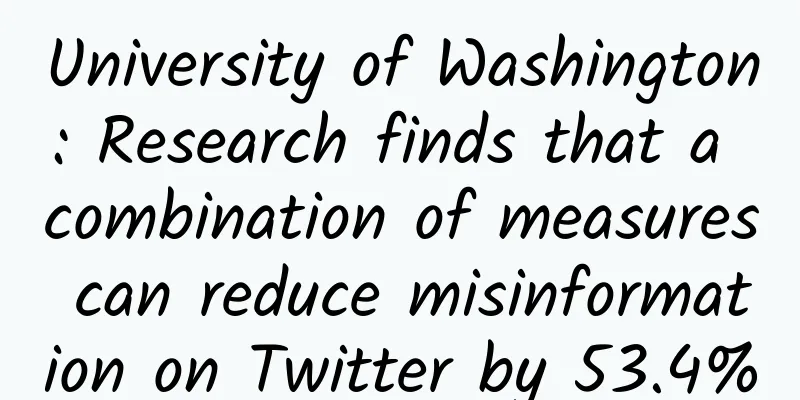University of Washington: Research finds that a combination of measures can reduce misinformation on Twitter by 53.4%

|
Social media platforms like Facebook, Instagram, and Twitter are rife with misinformation that can spread easily. After analyzing tens of millions of tweets, a new study finds that there are steps that can be taken to slow the spread of false information on Twitter. The new study, published last week in Nature, found that deplatforming repeat misinformation offenders, removing false claims and warning people about posts containing false information could reduce the amount of misinformation on Twitter by 53.4%. Jevin West, an associate professor at the UW School of Information and one of the co-authors of the paper, said these measures can all slow the spread of misinformation, but if only one measure is deployed, the effect will be discounted. The study found that by combining multiple measures, the results can be significantly improved. To determine what measures might slow viral misinformation on Twitter, the researchers looked at 23 million tweets related to the 2020 presidential election between September 1 and December 15 of that year. Each post was associated with at least one of the 544 viral events the researchers identified — defined as periods when stories exhibited rapid growth and decline. The researchers used the data to create a model similar to the infectious disease models epidemiologists use to predict the spread of infectious diseases. Through the model, the researchers were able to identify different measures, or interventions described in the study, that Twitter could apply to its platform to help stop the spread of misinformation. According to the study, the most effective was removing misinformation from the platform, especially within the first half hour after the content was posted. Also effective was kicking out repeat offenders, people who frequently share misinformation. According to Twitter's policy page, Twitter has taken some measures related to this, including making tweets from violating accounts ineligible for recommendations, preventing violating posts from appearing in searches, and moving replies from violating accounts lower in the conversation. The study also mentions nudges. These are warnings and labels used on tweets that advise people that a post contains false information. Twitter has used these widely throughout the COVID-19 pandemic for misinformation about the virus, treatments and vaccines. Twitter did not respond to a request for comment on the study. From cnBeta.COM |
<<: Daily Interaction: In 2023, Apple iPhone ranks first with 7.54% 5G market share
>>: Canalys: India's smartphone shipments to reach 38.9 million units in Q4 2023
Recommend
Can cold uterus in women generally lead to infertility?
With the frequent occurrence of female infertilit...
Pubic hair plays a big role, but removing it has hidden dangers
When many girls grow to puberty, their bodies beg...
Swollen gums are a sign of pregnancy
For most people, pregnancy is a very happy thing,...
What to eat to maintain the uterus after abortion
We all know that having a healthy body is closely...
What are the precautions after cesarean section?
Cesarean section is a form of delivery, which has...
The harm of medical abortion plus uterine curettage
In today's society, people are becoming more ...
How to get rid of acne on girls' faces
I believe that those who have been troubled by ac...
26 weeks pregnant, stomach pain
After becoming pregnant, pregnant women must pay ...
What causes yellow leucorrhea with odor?
What causes excessive yellow leucorrhea with a pe...
Which fish is better for making fish balls? Can grass carp be used to make delicious fish balls?
We all know that fish balls are a common delicacy...
Polycystic warm nest syndrome
Polycystic ovary syndrome is also a big obstacle ...
Pain in lower abdomen at 8 months of pregnancy
For young people who want to become pregnant pare...
Can I drink blood-replenishing oral liquid during my period?
There are many causes of menstrual pain. Most peo...
How many days does it take to get clean after an abortion?
I believe that many women will get pregnant unexp...









